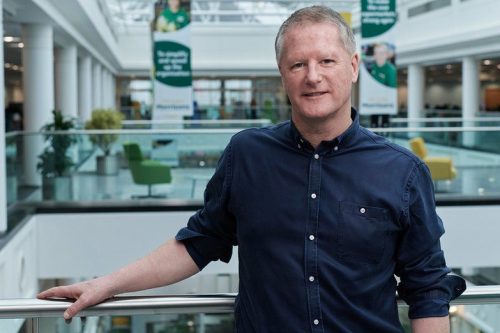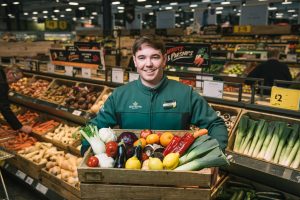The transformative chief executive who rescued Yorkshire’s proudest company

As Morrisons chief executive David Potts reveals he will step down after nine years running the supermarket group, it is hard to recall the levels of desperation that surrounded Morrisons in the months before his arrival.
Back in 2014, pointless misting machines, single bananas sold on a polystrene tray and wrapped in plastic, and widely-mocked marketing which saw a baguette beamed onto the wings of the Angel of the North statue were the symbols of a retailer that had lost its way and was losing its core customers.
Then-chief executive Dalton Philips had spent six months clinging onto his job after an awful AGM made memorable by the damning assessment of the supermarket’s driving force.
The late Sir Ken Morrison said: “I have something like 1,000 bullocks and, having listened to your presentation, Dalton, you’ve got a lot more bullshit than me.”
Morrisons had neglected online, its M Local convenience store offering was failing fast, and the retailer was getting out-fought and out-thought by the emerging discount retailers, Lidl and Aldi.
It was in rapid decline and there were concerns it might be terminal. In the summer of 2014 its former property director Roger Owen warned Morrisons was “a super tanker heading towards an iceberg”.

Former Morrisons chair Andrew Higginson
By then, the cavalry was beginning to gather. First over the top was former Tesco executive Andy Higginson, who joined the board as chairman-elect in October and removed Philips as the Christmas decorations were being taken down.
He was quickly joined by Potts, who had also been a key part of the team led by Sir Terry Leahy that turned Tesco into the dominant player in the UK supermarket sector.
The new chief executive officially started in mid-March. It was days after Morrisons had revealed annual losses of £800m, described by one retail analyst as “a truly awful year for Morrisons”.
Potts was instantly a natural fit for Bradford-based Morrisons. On the rare occasions he was photographed in the early days, tellingly he usually had his sleeves rolled up.
Six months after starting he set out six strategic priorities: to be more competitive; to serve customers better; find local solutions; develop popular and useful services; to simplify and speed up the organisation; to make core supermarkets strong again.
It might have appeared to be a statement of the bleeding obvious, but it was a radical change from the bullshit he inherited.
This focus on the basics of retail succeeded in turning the tanker around despite the initial scepticism of the City.
Its stores, shopping experience and consequently its results were transformed in the years that followed as the low-profile, high-impact chief executive made his mark.
The emphasis on customers and staff would later come to the fore during the first Covid lockdown, which saw it recruit 45,000 people to respond to demand as non-essential retailers were closed.
Its wide-ranging response including moving to immediate payments for its smaller suppliers – while changing its definition of “small” from those with £100,000 of business-a-year with the company to those with £1m of business – and the retailer donated £10m to foodbanks.
Under Potts, Morrisosns’ online proposition has been transformed, with its partnership with Amazon Prime adding speed and profile to its e-commerce offer. It has successfully embraced convenience stores through its takeover of McColl’s and earlier this year opened its 500th Morrisons Daily site. And while competition from the supermarkets once known as “the German discounters” remains a headache and has become a permanent feature of the UK supermarket sector, it has – for the most part- became a more even fight.
However the post-Covid period has been trickier. A long-running takeover bidding war ended with CD&R paying £7bn for the business in October 2021, which delivered a fantastic result for shareholders but may ultimately prove to be less positive for the retailer.

Morrisons’ incoming chief executive Rami Baitieh
The leveraged buyout has resulted in Morrisons having more than doubled its debt and it has since struggled to respond to the price competition from Aldi, which has replaced it as the UK’s fourth-largest supermarket.
Last year Morrisons’ losses reached £1.5bn, although the retailer is confident it is now moving forward with momentum.
Despite some concerns about the longer-term impact of the change of ownership, there is little doubt about the transformative impact Potts has had on one of Yorkshire’s business jewels.
Potts has described his nine years leading Morrisons as “the privilege of my working life”.
Not only will he be a hard act for incoming chief executive Rami Baitieh to follow, but it is worth remembering that without him there would not have been a thriving retailer to lead.









